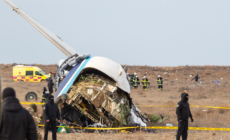-
Kyle Larson Drops Bombshell Comment as Huge Merger on the Table - 12 mins ago
-
Dale Earnhardt Jr. Confirms NASCAR Race Dates for 2025 Season - 47 mins ago
-
Trump’s Plans to Scrap Climate Policies Has Unnerved Green Energy Investors - 49 mins ago
-
The Deadliest Plane Crashes of 2024: Brazil and Russia Top the List - about 1 hour ago
-
Chrismukkah, the Mash-Up Holiday for Interfaith Families - 2 hours ago
-
NASCAR and Lowe’s Deliver Christmas Hope to Hurricane Victims - 2 hours ago
-
King Charles Addresses U.K. Riots and His Cancer in Christmas Speech - 2 hours ago
-
Christmas Day in L.A. County jail: Mass, carols and ramen - 3 hours ago
-
Pet Food Brand Recalled For Bird Flu Contamination After House Cat Dies - 3 hours ago
-
I Never Felt Like This in China Before - 3 hours ago
Opinion | The War in Gaza Told Through One Man’s Pain
When President Biden weighs American policy toward Gaza, may he think of a gentle scholar named Mohammed Alshannat.
Alshannat is a Palestinian in Gaza who at the start of the war was working remotely on his Ph.D. dissertation in linguistics for Rhodes University in South Africa. He is the opposite of Hamas, for in his writing he has criticized suicide bombings and rocket firings. He admires European democracy and argues that Arabs and Jews can live in harmony.
I have been texting him during the war, but his main outside contact has been Lindsay Houghton, a fellow doctoral student at Rhodes. With Alshannat’s permission, I am quoting from his texts to Houghton. I cannot independently verify what he writes, but it meshes with what aid workers describe. I have trimmed for length, but he wrote in English and these are his words:
Oct. 11: The situation in Gaza is very grave. Forgive me as I couldn’t reply any sooner. I was running for my life. Pray for us please!
Oct. 25: My children are very, very sick. They are sick, hungry, thirsty and scared. My kidney stone medicine has run out and I have been drinking salty water. Please pray for my children.
Oct. 26: Last night, there was heavy bombing in our area. We run for our lives and I lost two of my children in the dark. Me and my wife stayed all night searching for them amidst hundreds of airstrikes. We miraculously survived an airstrike and found them fainted in the morning. Please pray for us.
Nov. 4: Please forgive me for not being able to reply to your messages as we are constantly running from one place to another. Internet connection is not stable and one has to wait three days just to charge your mobile. My children can’t move around much as we only eat half a meal a day and I can’t carry them anymore. We defecate in the open and my children defecate on themselves and there is no water to clean them.
Nov. 14: We are eating tree leaves.
Nov. 30: We were completely cut off from the world in the last 15 days. My sister needs an urgent surgery. She is dying slowly before our eyes and we can do nothing about it. Her name is Fatemah and she is a mother of four. Pray for her and us.
Dec. 1 [after a weeklong pause in fighting]: I have managed to get some flour, gas and olive oil. This will sustain us for the following two weeks. We have clean water now. We got sleep during the past seven days. Pray for us please! The war has restarted at 7 a.m. today.
Dec. 4: Fatemah hasn’t yet had her urgent surgery. The world has abandoned us. Pray for us please!
Jan. 27: My son was seriously injured on Dec. 22. A large shrapnel entered his right flank. He is 13 years old and was injured while we were running for our lives. Hospitals are out of service and I had to carry him bleeding under heavy artillery shelling for two hours. I found a doctor who was sheltering in a school, and he took a risk and saved my son’s life. He went through a complicated surgery later and still unable to walk. He is very sick and suffers from malnutrition. I am scared and bone tired. It took me 36 days just to get this internet connection to send a WhatsApp message. Please pray for us!!
Feb. 6: My sister Fatemah hasn’t yet done her surgery and is still waiting in the hospital in the south. Her children are with us in the north and keep asking for their mother. Fatemah wants to go back to the north but Israel does not allow those in the south to go back to the north. She does not want to die alone in the hospital. She wants to die surrounded by her children and family. There is no one to help us to take her to the north to die and be buried here.
I am still in the north with my family. We are in a great famine. My injured son’s health is deteriorating because of the famine. There is no milk, meat, vegetables, fruit or anything to feed him. He lost most of his weight. Medicine and other stuff completely disappeared from the markets. My mother’s diabetes medicine has run out and she is very, very sick. My children are crying from hunger all the time. People are hoping that Israel nukes us so we get rid of this pain.
Feb. 11: Rice, on which we have been living off in the last four months, has completely disappeared from the markets. Me and my wife have decided to eat a meal every two days just to keep our kids alive as long as we can. What is left for us is hay. We have started grinding it, bake it and eat it. Because we have started eating the hay bread, we now defecate blood mixed with hay.
I lost my house, my car and my olive farm. Yesterday my cousin lost her 2-month-old baby because there is no milk to breastfeed him, because there is nothing for her to eat. He was her only and she is 45 years old. She also lost her house and her husband in December. She is a brilliant brain surgeon. She is refusing food and has not spoken a word since.
Feb. 29: When the Israeli army invades an area, we run to safer places. When they withdraw, some of the Israeli soldiers’ leftovers like tuna cans, bread, etc. remain. My cousin, Esa, thought that they have withdrawn and quickly rushed in the hope that he finds leftovers to eat.
After the Israeli army finally withdrew, we found him dead, rotten and half eaten by wild dogs. He seemed to be carrying some tuna cans. We couldn’t bury him as his body was so decomposed. We covered him with sand and left him.
His name is Esa Alshannat. He was 20 years old. He was a sophomore student in the department of computer science at Gaza university. He was a brilliant pianist who wanted to pursue a music degree in Italy. I still remember my last meeting with him. He had big dreams and was full of hope, peace and love. He was very hungry and very skinny. We were telling each other that despite what is being inflicted on us, we have nothing against the Israelis but love.
***
That was the last message from Alshannat.
Roughly 1 percent of Gaza’s people today are Hamas fighters. To understand what the other 99 percent are enduring, as the United States supplies weapons for this war and vetoes cease-fire resolutions at the United Nations, think of Alshannat and multiply him by two million.





















